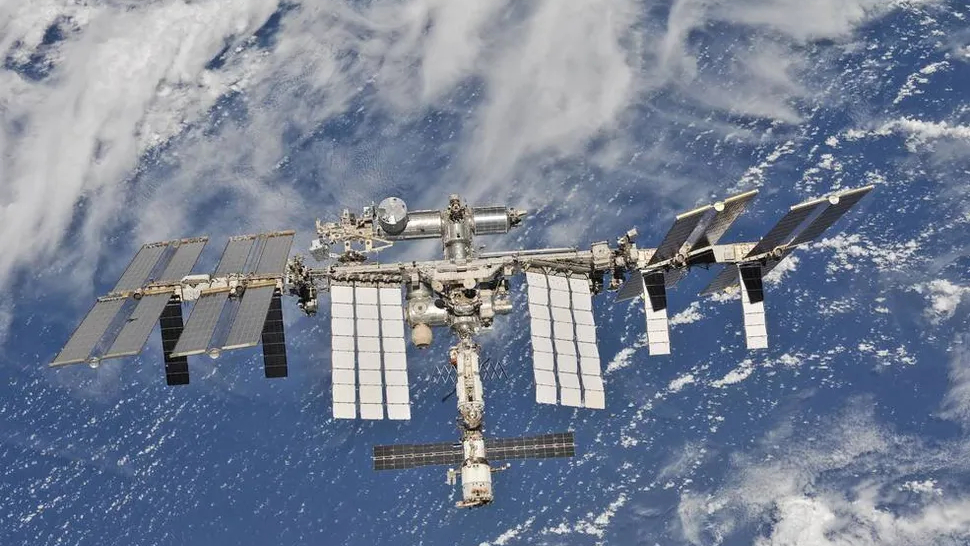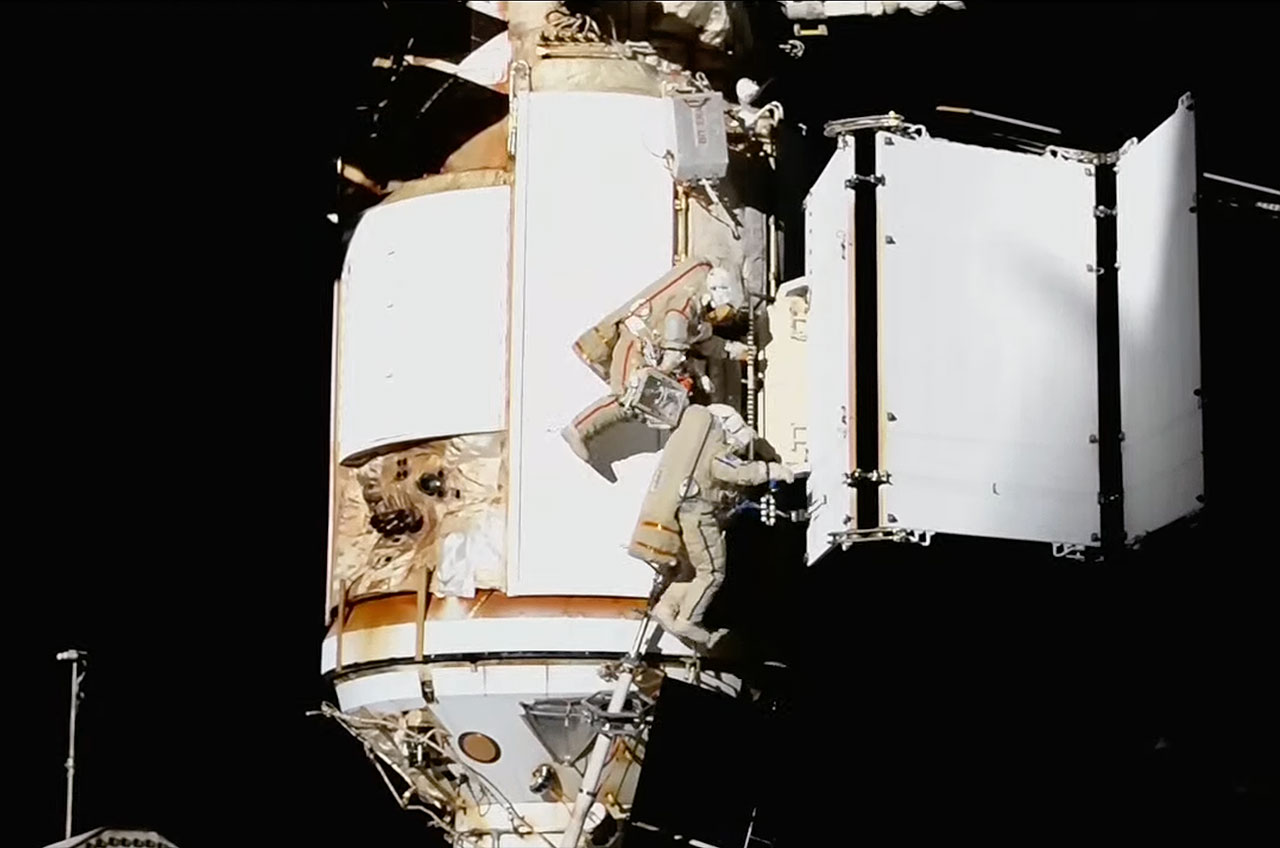International Space Station leaks coolant into space, but astronauts are not in danger
It's the latest in a series of coolant leaks on Russian space station equipment in recent months.

Space station astronauts were "never in any danger" following a coolant leak Monday (Oct. 9) on a Russian module, NASA officials have said.
Toxic ammonia flakes were observed on the International Space Station's (ISS) Russian Nauka Multipurpose Laboratory Module (MLM) around 1 p.m. EDT (1700 GMT). Personnel in NASA's Mission Control in Houston first spotted the "possible" leak on camera.
Agency astronaut Jasmin Moghbeli (on board the ISS) confirmed the backup radiator leak after looking at it through the station's wrap-around cupola windows, NASA officials wrote in an update five hours later.
It is unclear whether the leak will require a spacewalk by Roscosmos cosmonauts for repairs to the science module, or whether the situation will delay an already planned spacewalk by NASA astronauts (in a different kind of spacesuit) expected to take place on Oct. 12. (Ammonia is so toxic that spacewalks nearby the substance must have extra precautions built in to reduce exposure risk to astronauts.)
But NASA officials emphasized that for now, the backup radiator leak has "no impacts to the crew or to space station operations," and that the primary radiator for Nauka continues to work normally. NASA officials added the leak, the latest in a series aboard Russian ISS equipment in recent months, remains under investigation.
Related: Track the ISS: How and where to see it
Russia's federal space agency, Roscosmos, confirmed the leak to NASA and also in a statement on Telegram. "The temperature at the MLM is comfortable," Russian officials wrote on Telegram (translation provided by Google) and they also said there are no changes to operations, experiments or crew exercise periods.
Breaking space news, the latest updates on rocket launches, skywatching events and more!
The leaky backup radiator was originally for a different Russian module aboard the space station, called Rassvet, and was delivered to the ISS via space shuttle mission STS-132 in 2010. A Roscosmos spacewalk in April 2023 transferred the then-functional backup radiator to Nauka.
For now, NASA has asked its Expedition 70 ISS astronauts to close all shutters on the U.S. segment of the space station "as a precaution against contamination," agency officials wrote. (NASA and Roscosmos are both majority stakeholders in the ISS, alongside smaller space station partners.)
Ammonia is required to cool the ISS because the station's systems produce "waste heat," according to NASA documentation. Waste heat is removed through cold plates (devices that cool electronics) and heat exchangers. Both these device types require circulating ammonia coolant, located in a closed-loop system on the outside of the space station. The warmed ammonia's heat releases into space via radiators, such as the leaky one aboard Nauka, allowing for the liquid's recirculation in the loop for a new round of cooling.
Related: SpaceX Crew-7 astronauts will handle over 200 science experiments on ISS
The Nauka leak is the latest in a string of ISS Russian equipment coolant escapes in recent months. Roscosmos has said the last two incidents were likely due to micrometeroid impacts, although Harvard-Smithsonian space analyst Jonathan McDowell told The Guardian he suspects there is a "systemic" problem.
"You've got three coolant systems leaking — there's a common thread there. One is whatever, two is a coincidence, three is something systemic," McDowell said in the report. McDowell is an astrophysicist and astronomer who also tracks launches, re-entries and other major spaceflight milestones.
The most dramatic of the two other Russian leaks was a December 2022 incident aboard the Soyuz MS-22 spacecraft, shortly before a scheduled Roscosmos spacewalk; two cosmonauts were in fact already suited up to exit the station just before the leak happened. The extravehicular activity was canceled due to the risk to the cosmonauts.
Roscosmos next examined its options for the spacecraft, then set to carry three astronauts home in early 2023. The Russian agency determined it was best to quickly send up an empty replacement Soyuz, MS-23, and return MS-22 back to Earth for analysis.
Soyuz crews typically launch every six months. As such, the relief Soyuz crew wasn't fully trained yet for the accelerated MS-23 launch in February 2023, necessitating a wait until yet another spacecraft (MS-24) was ready in September to carry them to the ISS.
After the relief crew arrived, the three MS-22/MS-23 astronauts then returned home in the replacement spacecraft, having been required to spend 12 months on the ISS instead of six to accommodate the spacecraft changeover. In the meantime, a Russian cargo spacecraft (Progress 82) also sprung an ammonia leak in February 2023.
There have been other incidents with Russian ISS equipment in recent years. Faulty software aboard Nauka when it first docked with the ISS in July 2021, for example, briefly tilted the space station and caused NASA's Mission Control to declare an emergency, although the crew was never in any danger and the situation was swiftly and safely rectified.
And another Russian Soyuz spacecraft docked with the orbiting complex in 2018 somehow ended up with a hole, which was plugged by orbiting astronauts before the spacecraft safely returned home. The cause may have been a manufacturing defect, although reports also emerged in 2021 that Roscosmos was trying to blame U.S. astronauts for the situation.
Tensions erupted between Russia and most of the other ISS partners in February 2022 following Russia's unsanctioned invasion of Ukraine that year, which is ongoing. Relations regarding the ISS have been normal, NASA officials continue to emphasize, but most other space partnerships between Russia and other ISS partners have been severed amid the war. The ISS is scheduled to continue operations until at least 2030, although Russia has only committed to 2028 so far.

Elizabeth Howell (she/her), Ph.D., was a staff writer in the spaceflight channel between 2022 and 2024 specializing in Canadian space news. She was contributing writer for Space.com for 10 years from 2012 to 2024. Elizabeth's reporting includes multiple exclusives with the White House, leading world coverage about a lost-and-found space tomato on the International Space Station, witnessing five human spaceflight launches on two continents, flying parabolic, working inside a spacesuit, and participating in a simulated Mars mission. Her latest book, "Why Am I Taller?" (ECW Press, 2022) is co-written with astronaut Dave Williams.

